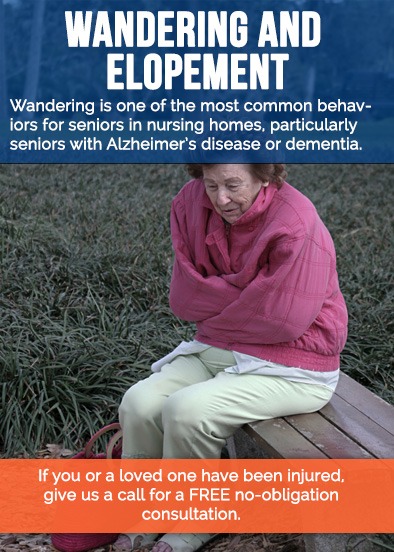Atlanta Nursing Home Neglect Lawyer
 Wandering is one of the most common behaviors for seniors in nursing homes, particularly seniors with Alzheimer’s disease or dementia. It’s also one of the most dangerous.
Wandering is one of the most common behaviors for seniors in nursing homes, particularly seniors with Alzheimer’s disease or dementia. It’s also one of the most dangerous.
When seniors wander, it means they walk around for unexpected reasons or no clear reason at all. They may be lucid and aware of what they’re doing, or they may be confused.
In some cases wandering can lead to elopement. “Elopement” simply means the senior wanders out of a safe, controlled area. They might leave nursing him grounds and walk into traffic, get lost in the neighborhood, or trip and fall. All wandering can lead to accidents but elopement dramatically increases the risk.
If someone you love was hurt due to wandering or elopement in a nursing home, you need professional legal advice.
The attorneys of John Foy & Associates are experienced with Atlanta nursing home lawyer and have helped families of seniors receive a fair recovery in wandering cases before. Call us at 404-400-4000 and get a free consultation today.
Get the strong arm
Why does Alzheimer’s Disease Cause Wandering and Elopement?
Alzheimer’s disease is not the only cause of wandering and elopement, but it’s probably the most common. Many seniors experience a form of confusion or dementia as part of Alzheimer’s disease, or from other diseases of the mind as they age. 3 out of 5 seniors with Alzheimer’s will wander at some point.
Wandering connected to dementia does not always happen in a fugue state. The senior may be well aware of their intention to go somewhere, and simply not understand the consequences. Or they may be acting from curiosity (“I wonder what’s over here?”) paired with a loss of memory about their environment.
On other cases the senior is very confused as they wander. They may think they going to visit a loved one, believe they’re in a different time or place, or feel that they “need” to go somewhere without knowing why. They may also experience a mixture of all of these—a senior might decide to “go for a walk” in a lucid moment, but then become confused by their surroundings or forget what they’re doing.
Wandering is not always a negative thing. Within a safe, supervised area, it can be a healthy way to work off restlessness. Seniors who wander within (for example) a secure courtyard on a pleasant day may actually experience health benefits from the exercise, and exhibit less anxiousness or agitation afterward. The danger comes when staff do not anticipate the wandering, when the area isn’t safe, or when seniors “elope” to the outside and disappear.
What Else Causes Elopement Besides Alzheimer’s/Dementia?
Seniors may wander or elope for other reasons:
- They may not want to live at a nursing home, and purposefully make an effort to leave.
- Changes in environment can increase the risk of eloping. A senior may have no history of wandering, but following a change in room or residence, feel unexplainably restless.
- Medications can cause wandering. This is a known risk of some types of drugs, such as sedatives and neuroleptic drugs, or it can be caused by polypharmacy.
What Are the Risks When a Senior “Wanders”?
Wandering and elopement are extremely dangerous. The risks can include:
- Getting hurt in an uncontrolled part of the nursing home, such as the kitchen
- Wandering outside and getting lost
- Stepping into traffic
- Falling
- Dehydration and exposure to cold weather or very hot weather
- Having a medical episode with no care staff around
- Not getting regularly scheduled medications on time
It’s easy see how these risks can lead to serious injury or health consequences. Sadly, they can also be fatal. A number of cases of elopement have resulted in death by exposure.
Are Nursing Homes Liable for the Results of Wandering or Elopement?
Yes. A nursing home’s duty is to provide a safe, supervised environment for all residents. While a nursing home cannot prevent every injury, they can—and must—take practical steps to manage wandering.
Some of the steps a nursing home should take include:
- Staff preparation. All staff should understand wandering and what to look for to keep it safe. All residents should be assessed for wandering risk, and staff should know which ones are at high risk. Staff must also understand sundowning and other circumstances that make wandering more likely.
- Prevention. Within the facility, all areas open to residents should be safe and comfortable for seniors, and all other areas should be controlled. Common areas must be monitored. Residents who are at high risk should be checked on regularly, and all doors to the outside should either be alarmed (such as fire exits) or monitored (such as a front entrance for guests). Residents should also be treated well—one of the best ways to prevent wandering is to offer meaningful, engaging activities within the residence.
- Appropriate response. Anytime a resident appears to go missing, staff should be trained to respond with both a coordinated search of the facility, and an immediate search of the surrounding, outside area.
Note that antipsychotic medications and physical restraints are not an appropriate way to prevent wandering, and can cause further risks.
There’s nothing mysterious about wandering. Most seniors who elope out of the premises have a previous history of wandering or show other risk factors beforehand.
The methods to prevent wandering and manage restless seniors are well known and are supposed to be standard practice. If a nursing home resident elopes, the nursing home did not do their job right.
Don’t allow a nursing home’s negligence to harm someone you love. If your family member has been hurt due to a case of wandering or elopement, you can hold the nursing home responsible.
This may include a financial recovery that helps you pay for treatment, therapy and proper care. John Foy & Associates is one of the leading Atlanta elder care law firms. We offer a FREE consultation and we charge nothing unless we get you a financial recovery. Call 404-400-4000 and get your free consultation today.
404-400-4000 or complete a Free Case Evaluation form




